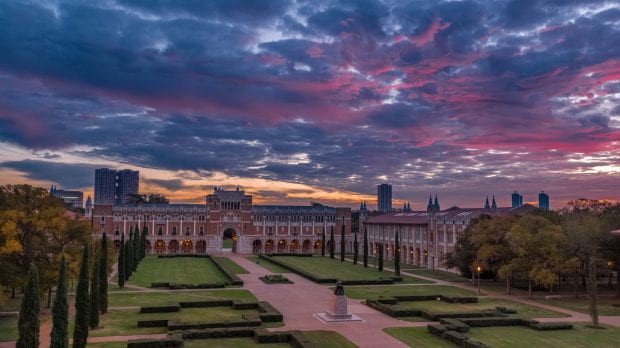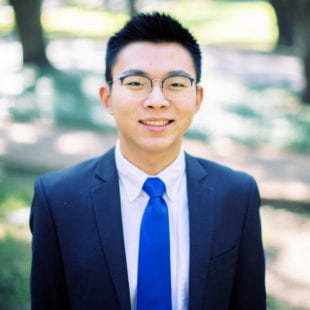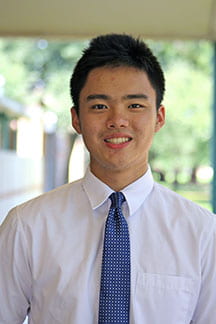Rachel Kimbro’s class is partnering with the Woodson Research Center to document an unprecedented campus closure
A journaling project that began as an impromptu lesson on the 1918 influenza pandemic will capture 49 Rice students’ experiences as they spend the rest of the semester off campus and learning remotely during the COVID-19 outbreak.
Sociology professor Rachel Kimbro has been teaching her popular Medical Sociology course for over a decade, addressing such topics as how inequality influences health. But last month, Kimbro went off script at the request of her students to teach an ad hoc class about the 1918 pandemic.

An unprecedented campus closure means most Rice students are living and learning remotely. Rachel Kimbro’s class is capturing student experiences during the COVID-19 outbreak for the Rice archives. (Photo by Brandon Martin)
“Everything was pretty normal at that point,” Kimbro said. The novel coronavirus was not yet in the news 24 hours a day, but her students — most of them seniors, most of them going on to medical school or into public health following graduation — wanted to know more about the last great pandemic to hit the United States.
Kimbro covered the basics from her own area of expertise, discussing social epidemiology and disease transmission. Only a small portion of the lecture that day was devoted to talking about how the 1918 pandemic affected Rice. But the students, she said, were fascinated.
“It got them thinking about what might happen on campus, although none of us imagined that it would be a closure,” Kimbro said by phone this week. Rice made the decision to send students home and continue courses online March 12.

Sociology professor Rachel Kimbro gave an impromptu lecture on the 1918 influenza pandemic a month ago, which spawned the idea for a class journaling project. (Photo by Jeff Fitlow)
Kimbro contacted Rice University Centennial Historian Melissa Kean and found that very little documentation exists from that time describing how the 1918 pandemic affected life at Rice. Kean found only one personal account of the flu in the Rice archives — and that account was written in 1975.
When the 1918 influenza pandemic hit Rice, the young university was already busy with other concerns: The outbreak of World War I had already drastically changed everyday life on campus.
Because so little had been preserved detailing the impact of the 1918 pandemic on Rice students, Kimbro and her students decided to partner with Kean to ensure this wouldn’t happen again.
“There will be plenty of official communications from the university that will go into the archives,” Kimbro said, but she wanted to ensure the student perspective was preserved as well.
Through the end of the semester, Kimbro’s 49 students will turn in journal entries of their contemporaneous experiences during an unprecedented campus closure. Their work will be compiled and archived at the Woodson Research Center for future researchers to use.
“These past few weeks have been quite chaotic for me, but I appreciate reading other students’ submissions regarding their experience with the COVID-19 outbreak,” said Will Rice College junior Stanley Tsou. “It certainly brought me a sense of reassurance that we are in this together.”

The journaling project “brought me a sense of reassurance that we are in this together,” Will Rice College junior Stanley Tsou said.
Although students have the option to submit their journal entries to Kimbro privately, most have chosen to post theirs for other students in the class to see using Canvas, which has been a popular option for Rice professors moving their coursework online.
Now back home in California, Tsou used part of his spring break to submit his first journal entry about the experience. But he said he also used his first week away from campus to slow down, spend time with his family and reflect.
“Every day, I would also reconnect with my friends at Rice through video calling on Google Hangouts — just to check up on each other, see what others are doing to spend their time — and pray about this whole situation,” Tsou said. “As dire as it may seem, I commend Rice for taking precautionary steps to protect its students, staff and faculty from unintentionally transmitting the virus, which has caused havoc and anxiety in the lives of millions of people around the world.”
Hanszen College senior David Yang is among those whose last semester at Rice has been cut short, yet he’s remained optimistic throughout.
“I’d like future Rice students to know that this was a highly unusual yet unique time for the entire Rice community and that none of us expected this to happen,” Yang said. The cancellation or modification of important traditions such as Beer Bike, Rondelet, commencement and the last walk through the Sallyport, he said, made this semester “unlike any other.”
At the same time, he said, the closure has been “a good opportunity to appreciate aspects of our lives that we often take for granted, and to show empathy and responsibility to others during an uncertain time.”
Yang said he appreciated Kimbro incorporating journaling into her Medical Sociology class not only for the record he and his fellow students will be able to leave behind, but also for the opportunities afforded by the therapeutic act of journaling itself.

“It has definitely been a good conduit for processing all the emotions experienced,” Hanszen College senior David Yang said.
“The week of March 9 was an emotional roller coaster for the vast majority of Rice students,” he said. “Journaling at the end of the week gave me an opportunity to reflect on and consolidate everything that had happened in the past week and present my personal story regarding COVID-19.”
Reading the journal entries of his fellow students showed common themes of surprise, sadness, uncertainty and hope, he said.
“I would say it has definitely been a good conduit for processing all the emotions experienced and I appreciate learning about the perspectives and stories of my fellow classmates,” Yang said.
Kimbro said she is still processing her own emotions around all of the upheaval. She already misses seeing her students in person and the positive energy she said they always bring to class. She is also coming to terms with the fact that she already may have seen some of her seniors for the last time without even realizing it.
“When I said goodbye (before spring break) I had no idea that I wasn’t going get to see them again, in person, all together, you know, so it’s been very, very hard,” Kimbro said. This is one of the reasons she’ll be doing live classes remotely; it’s what her students wanted too.
“Hopefully that will kind of help us all feel a little bit more connected,” she said.
In the meantime, her students will be continuing their semester’s regular coursework online and turning in a new journal entry every two weeks. In addition to seeing her students’ faces on video classroom sessions, Kimbro said she’s looking forward to seeing how their thoughts on COVID-19 change over time.
“Right now they’re feeling sad and confused and scared, but what is it going to be like in two weeks?” Kimbro said. “I’m hoping to kind of capture some of that temporal element as well.”

